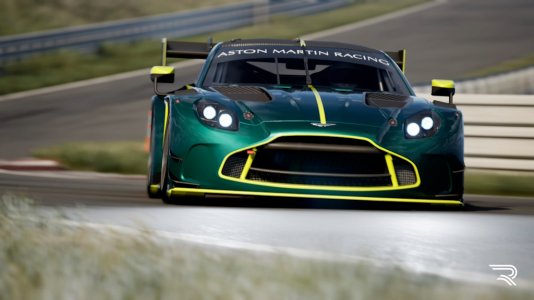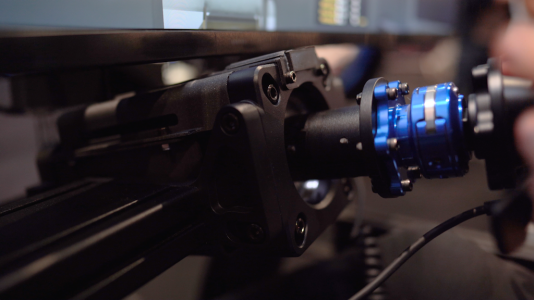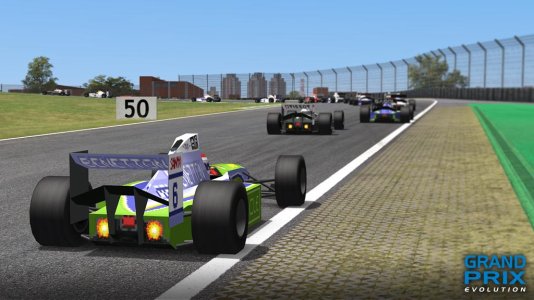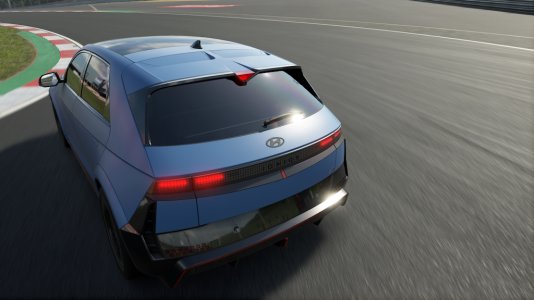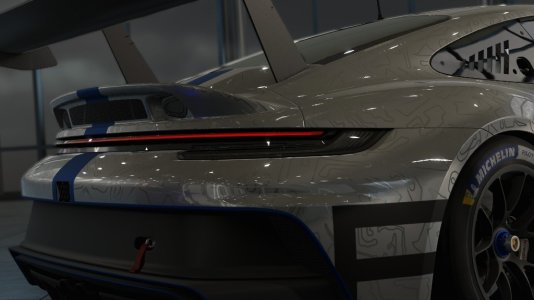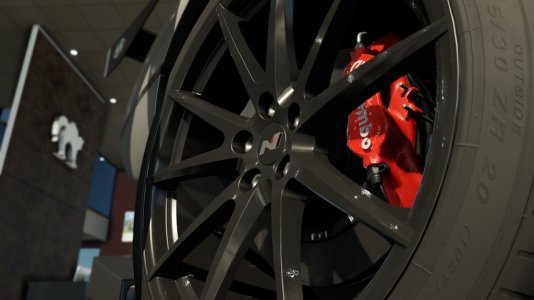I like what I'm reading from the docs in the GTR2 Get Real Physics Mod and I like that I can match what's written in the docs with what I feel in the car. Here's why I think you should give Get Real Physics a real look.
Updated 2024-01-14 for version 1.3
Need_For_Speed appears to be onto something investigating drivetrain, tyre model, and aerodynamics, discovering bad parameters, sloppy work, and copy&pasted values, and fixing issues with real world data and proper modelling.
Before You Try
How To Qualify
How To Race
Here's some highlights from the docs to show what the mod tries to improve.
Disclaimer: I'm in no position to verify the math or realism of any of this but the effort that appears to have gone into this I think is worthy of our attention.
The following are the original 1.0 details and may be outdated...
Drivetrain
"The most obvious thing to observe in HDC files was just how abysmal drivetrain loss was... In fact I managed to obtain exact number from Reiter Engineering which claim 10% drivetrain loss for Lamborghini."
"Together with new aerodynamics this demonstrated to be exactly right as we now have accurate straight line performance of the cars verified by onboard videos, email correspondence and speed trap data."
New Tyre Model
"New tires feature 3 distinctive slip curves now for acceleration, braking and lateral movement. Before all 3 used exactly the same curve which is unrealistic and also caused serious problems inside the game. For example lack of straight line stability¨at high speeds for mid engine cars which felt like you were driving a boat without keel instead of a high downforce race car! This was primarily caused by incorrect curve before the peak now tires use proper acceleration curve."
"Another issue was poor traction coming out of a corner. This behavior was caused by a combination of incorrect slip curve and too much power at the wheels. As you can see in my mod lateral slip curves remain unchanged because they come from a real GT tire. What I did however was add a separate curve for the rear tires which can be observed in GTR Evolution files and is a realistic feature. The curves are reverse engineered to match the characteristics of GTR2 lateral curves for all 3 brands."
"Similarly I did this for braking curves by reverse engineer data from GTR Evolution which uses separate curves. For the acceleration curve I have used Pirelli tires lateral curves from GTR2 and then reverse engineer those also for other 2 brands."
"Instead of just using some completely new set of data from different XYZ tire my goal was to recreate a proper 03/04 spec GT tire as GTR2 tire data is based on that."
"Some guy actually analyzed GTR2 slip curves years ago and this proved to be of great help to me developing new curves. Here we can observe that Pirelli tires have distinctive shape much different from the Michelin and Dunlop tires. It turns out that most likely this is actually acceleration curve based on published data I have seen but Simbin used them as lateral. This right here is the reason why Pirelli tires are so bad in corners compared to Michelin."
"Knowing real tire sizes it was possible now to reverse engineer grip coefficients for the same compound tires to a high degree of accuracy provided they are of similar size. Lap times inside the game only confirmed this. But I still had to have a model on which I could base my numbers on. That model was Lister Storm soft compound Dunlop tires. It appears that Simbin managed to get data for this and Pirelli soft tyres but not for medium and hard tyres. They just use 99% of the grip of the softs and mediums respectively which is way too high number. I determined coefficients for mediums looking at the actual lap times from the races and adjust them accordingly depending on tire size."
"I have also improved many other aspects of the tires:
- they no longer all use same camber data, but are based on published data for each brand
- issue with tires never getting to operating temparature has been resolved
- adjusted wear rate, rolling resistance and more"
Aerodynamics
"For some reason Simbin used multipliers in frontwing and rearwing data. This is ok if you look at very small drag numbers which by themselves don't make any sense until you multiply them by given number. The problem is that you also multiply lift values which are already correct values ending up with way too much downforce."
"GT cars have even bigger errors than NGTs because of larger multipliers. My theory is that Simbin deliberately made it like this because of the mixed class racing and issues that come with that namely issue of faster cars lapping slower class cars. This was one of the core marketed features of the game so it seems they have sacrificed realism for this feature. Fortunately with this mod you can have both. Accurate relative performances as well as fixed multi class racing."
"Body aero lift values are complete nonsense also body drag incorrect for a lot of cars"
"Many cars share exactly the same data for wings lift and drag, cars affected come mainly from 24H class"
"Wrong aero centers on majority of the cars affecting aero balance and thus handling"
"All of this means that cars aero balances are completely of the mark for some cars. Cornering performance is overmodelled/undermodelled depending how close they get original numbers to the real car."
"New physics also feature new wing lift and drag curve which now closely follows real one. That was achieved with carefully adjusting efficiency drop off values in wing data until I could get desired curve. Originaly they had used linear curve which is incorrect."
"They have made every single car bodywork have downforce instead of lift except for Morgan Aero8. In real life according to my research only Saleen, Maserati and M3 GTR bodywork produce actual downforce instead of lift not taking into account any diffusers or street wings."
"Another example is BMW M3 GTR. Way to much drag modeled for the same reasons as in Saleen case. Because of this the car is severely under performing and not reaching its meant top speed which was 265-267 at Spa judging by onboard videos i have from 2004. Even with just 5% drivetrain loss! Many cars primarily in 24H category have incorrectly set drag."
"There is also a big mistake Simbin made with how much drag increase there is with average ride height. In addition this number is exactly the same for all cars as if they all had the same tires! Based on my research I was able to recalculate this for all cars and now there is actually noticeable effect when raising ride height on top speed."
Other Improvements
"- updated CGHeight values to be more accurate
- set up new undertray parameters which now match physical dimensions of all cars
- model 2 set of brakes; carbon and iron
- corrected fuel tank positions which were very inaccurate for many cars
- modified brakes and radiator cooling values based on actual race car radiator size, brake ducts area and vented hoods. These numbers were all shared before between great majority of the cars now they more closely reflect reality.
- implemented real gearboxes for BMW M3 GTR and Z3M, Lamborghini, Corvette, Seat, TVR, 350Z. Previously these cars shared their ratios with other cars, now they use real data."
"As it turns out many cars had only 1 splitter setting not 2. Cars affected:
JMB and Wieth Ferrari 550, Saleen, Maserati, Corvette, Porsche 993GT2, 350Z, TVR, M3 GTR, Lotus, Morgan and Mosler."
"AI is extremely competitive now while still retaining original driver skill set. They use improved suspension model which is closer to player physics."
"Physical damage has been reduced in order to fix AI slowing down during a race."
"Artificially added bumps in specialfx file have been removed from all tracks surfaces. Only track geometry affects suspension now."
Updated 2024-01-14 for version 1.3
Need_For_Speed appears to be onto something investigating drivetrain, tyre model, and aerodynamics, discovering bad parameters, sloppy work, and copy&pasted values, and fixing issues with real world data and proper modelling.
Overview
- Highlights
- Before You Try
- How to Quality
- How to Race
- Details
Highlights
- Drivetrain:
- Discovered abysmal drivetrain loss through HDC files, with Reiter Engineering confirming a 10% loss for Lamborghini.
- Drivetrain modeling moved to the Engine file from the HDC file where the clutch friction parameter was being used before. This results in improved standing starts and low rpm/high gear acceleration as well as braking stability (in so far as it is affected by the drivetrain).
- New aerodynamics complemented the drivetrain improvements, resulting in accurate straight-line performance.
- Engine
- Fixed engine performance modelling to be more realistic
- Some engines were over-powered and needed down-tuning
- Suspension:
- Improved accuracy of wheel mass data with corresponding changes to inertial values
- Fixed original cars having all the same unsprung mass (except Lotus) and inaccurate inertial properties. Spin inertia and wheel/spindle friction values have been updated to reflect these changes.
- These changes have a small effect on total drivetrain loss simulated per vehicle.
- New Tyre Model:
- Implemented three distinct slip curves for acceleration, braking, and lateral movement.
- Addressed issues with straight-line stability and poor traction coming out of corners.
- Reverse-engineered curves from GTR2 and GTR Evolution to match real GT tire characteristics.
- Adjusted grip coefficients based on tire size and lap time analysis.
- Front tyres were intentionally downgraded in stock GTR2 and have now been improved to unlock their full potential. This feels like much better front-end grip.
- Tire Improvements:
- Introduced brand-specific camber data instead of using the same values for all tires.
- Resolved issues with tires not reaching operating temperature and adjusted wear rate and rolling resistance.
- Front tires now have identical performance to rears: Original tires were downgraded to achieve stability due to shortcomings in the original tire model. With tire model improvements, front tires can be properly modelled.
- AI tire model is improved and now more realistic helping to bring AI performance closer to Player car.
- Aerodynamics:
- Simbin's use of multipliers in front-wing and rear-wing data led to excessive downforce.
- Identified errors in lift values, body drag, and aero centers, affecting aero balance and handling.
- Improved wing lift and drag curves to closely resemble real-world data.
- Corrected bodywork lift/downforce values for most cars.
- Improved drag coefficients for radiators, brake ducts, tyres
- Other Improvements:
- Updated CGHeight values and adjusted undertray parameters for improved accuracy.
- Modelled two sets of brakes (carbon and iron) and implemented realistic gearboxes for specific car models.
- Corrected fuel tank positions, adjusted brake and radiator cooling values based on actual race car specifications.
- Fixed incorrect splitter settings for affected cars.
- Enhanced AI competitiveness and suspension model, reduced physical damage, and removed artificial bumps from track surfaces.
Before You Try
- Read INSTRUCTIONS.docx
- Copy GameData folder to your GTR2 root folder
- UIData folder enables final drive adjustment for gearbox on some cars
- You must modify UserData\User\User.PLR and copy&paste in the values from this document
- You must manually remove the specified GameData\Teams files mentioned in the document to avoid issues
- Read Driving Tips.docx
- Cars are easier to drive in slower corners but more difficult in faster corners
- Brakes heat and cool much quicker. Overheated brakes have less braking power. This may result in rears having more braking power in overheated situations and resulting in rear end looseness. Run brake ducts full open in a race ("like real teams do").
- Medium and Hard tyres have less grip but, because of overall tire model improvements, cornering ability is improved. Original tire model understeering is improved.
- Ride height can be important. If you use Motec, it can be helpful to get optimum values from it.
- Check REAL LAP TIMES.png and SIMULATED LAP TIMES.png
- These laptimes demonstrate the accuracy of the mod's efforts to improve car and AI performance realism
- Laptimes can also give you a general idea for how your car and AI cars should be performing on track but it is not precise due to variables like AI Talent files, which driver is in, fuel levels, tyre compound, etc.
- Documented laptimes are at 100% AI Difficulty
How To Qualify
- Qualify like you mean it: For the best experience, you need to run laps until you feel you can't get any better time or at least the few 10ths or 100th out there aren't worth it. The closer you are to your real best self the better you will feel the AI will compete with you instead of just passing them easily or them getting away from you easily.
- How I do it: For familiar tracks, it might take about 3 laps to get up to competent time, then I keep going until set new session bests. There will come a point where I know I've put in a real good time and then I'll use the momentum to put in another few laps to see if I can keep the streak going and set a new session best time. For familiar tracks, this all usually takes less than 10 laps.
- Don't Skip Session: Do not skip the session, use time acceleration, instead, to ensure all AI get a time in. Failure to do this may result in random grid positions because some AI have not got a qualifying time in.
- Optimum Track Conditions: Go ahead and qualify immediately but be aware the track will not be warmed up or as rubbered in as it will be later in qualifying. You can often achieve better laptimes later in qualifying. Use time acceleration to go to 10-20 minutes left in qualifying and you'll have a well warmed up track that is rubbered in and now you'll be able to achieve better laptimes.
- Save Time Finding Good AI Level: If you're too fast or too slow (ie. not the position you want to be) then note your time, exit the session, and run qualifying again with a different AI level using time acceleration. Compare your time against the AI and see if your time would lie where you would like to qualify. Change the AI level if you're unsatisfied and repeat. You don't have to actually put in qualifying laps until you see you're at the right AI level.
How To Race
- Wait For Green: Jumping the Green Flag is easy and can get you an unfair advantage. Wait for it and you should accelerate realistically with the AI instead of getting ahead of them.
- Do not pass until lap 2: This gives AI time to settle from lap 1 chaos and reach a competitive level
- Do not try passes on AI you wouldn't try on a human: You will give yourself a better AI experience if you treat them like real humans and don't abuse them. If you wouldn't do it in real-life, don't do it to the AI. You'll have a much better experience.
Details
Here's some highlights from the docs to show what the mod tries to improve.
Disclaimer: I'm in no position to verify the math or realism of any of this but the effort that appears to have gone into this I think is worthy of our attention.
The following are the original 1.0 details and may be outdated...
Drivetrain
"The most obvious thing to observe in HDC files was just how abysmal drivetrain loss was... In fact I managed to obtain exact number from Reiter Engineering which claim 10% drivetrain loss for Lamborghini."
"Together with new aerodynamics this demonstrated to be exactly right as we now have accurate straight line performance of the cars verified by onboard videos, email correspondence and speed trap data."
New Tyre Model
"New tires feature 3 distinctive slip curves now for acceleration, braking and lateral movement. Before all 3 used exactly the same curve which is unrealistic and also caused serious problems inside the game. For example lack of straight line stability¨at high speeds for mid engine cars which felt like you were driving a boat without keel instead of a high downforce race car! This was primarily caused by incorrect curve before the peak now tires use proper acceleration curve."
"Another issue was poor traction coming out of a corner. This behavior was caused by a combination of incorrect slip curve and too much power at the wheels. As you can see in my mod lateral slip curves remain unchanged because they come from a real GT tire. What I did however was add a separate curve for the rear tires which can be observed in GTR Evolution files and is a realistic feature. The curves are reverse engineered to match the characteristics of GTR2 lateral curves for all 3 brands."
"Similarly I did this for braking curves by reverse engineer data from GTR Evolution which uses separate curves. For the acceleration curve I have used Pirelli tires lateral curves from GTR2 and then reverse engineer those also for other 2 brands."
"Instead of just using some completely new set of data from different XYZ tire my goal was to recreate a proper 03/04 spec GT tire as GTR2 tire data is based on that."
"Some guy actually analyzed GTR2 slip curves years ago and this proved to be of great help to me developing new curves. Here we can observe that Pirelli tires have distinctive shape much different from the Michelin and Dunlop tires. It turns out that most likely this is actually acceleration curve based on published data I have seen but Simbin used them as lateral. This right here is the reason why Pirelli tires are so bad in corners compared to Michelin."
"Knowing real tire sizes it was possible now to reverse engineer grip coefficients for the same compound tires to a high degree of accuracy provided they are of similar size. Lap times inside the game only confirmed this. But I still had to have a model on which I could base my numbers on. That model was Lister Storm soft compound Dunlop tires. It appears that Simbin managed to get data for this and Pirelli soft tyres but not for medium and hard tyres. They just use 99% of the grip of the softs and mediums respectively which is way too high number. I determined coefficients for mediums looking at the actual lap times from the races and adjust them accordingly depending on tire size."
"I have also improved many other aspects of the tires:
- they no longer all use same camber data, but are based on published data for each brand
- issue with tires never getting to operating temparature has been resolved
- adjusted wear rate, rolling resistance and more"
Aerodynamics
"For some reason Simbin used multipliers in frontwing and rearwing data. This is ok if you look at very small drag numbers which by themselves don't make any sense until you multiply them by given number. The problem is that you also multiply lift values which are already correct values ending up with way too much downforce."
"GT cars have even bigger errors than NGTs because of larger multipliers. My theory is that Simbin deliberately made it like this because of the mixed class racing and issues that come with that namely issue of faster cars lapping slower class cars. This was one of the core marketed features of the game so it seems they have sacrificed realism for this feature. Fortunately with this mod you can have both. Accurate relative performances as well as fixed multi class racing."
"Body aero lift values are complete nonsense also body drag incorrect for a lot of cars"
"Many cars share exactly the same data for wings lift and drag, cars affected come mainly from 24H class"
"Wrong aero centers on majority of the cars affecting aero balance and thus handling"
"All of this means that cars aero balances are completely of the mark for some cars. Cornering performance is overmodelled/undermodelled depending how close they get original numbers to the real car."
"New physics also feature new wing lift and drag curve which now closely follows real one. That was achieved with carefully adjusting efficiency drop off values in wing data until I could get desired curve. Originaly they had used linear curve which is incorrect."
"They have made every single car bodywork have downforce instead of lift except for Morgan Aero8. In real life according to my research only Saleen, Maserati and M3 GTR bodywork produce actual downforce instead of lift not taking into account any diffusers or street wings."
"Another example is BMW M3 GTR. Way to much drag modeled for the same reasons as in Saleen case. Because of this the car is severely under performing and not reaching its meant top speed which was 265-267 at Spa judging by onboard videos i have from 2004. Even with just 5% drivetrain loss! Many cars primarily in 24H category have incorrectly set drag."
"There is also a big mistake Simbin made with how much drag increase there is with average ride height. In addition this number is exactly the same for all cars as if they all had the same tires! Based on my research I was able to recalculate this for all cars and now there is actually noticeable effect when raising ride height on top speed."
Other Improvements
"- updated CGHeight values to be more accurate
- set up new undertray parameters which now match physical dimensions of all cars
- model 2 set of brakes; carbon and iron
- corrected fuel tank positions which were very inaccurate for many cars
- modified brakes and radiator cooling values based on actual race car radiator size, brake ducts area and vented hoods. These numbers were all shared before between great majority of the cars now they more closely reflect reality.
- implemented real gearboxes for BMW M3 GTR and Z3M, Lamborghini, Corvette, Seat, TVR, 350Z. Previously these cars shared their ratios with other cars, now they use real data."
"As it turns out many cars had only 1 splitter setting not 2. Cars affected:
JMB and Wieth Ferrari 550, Saleen, Maserati, Corvette, Porsche 993GT2, 350Z, TVR, M3 GTR, Lotus, Morgan and Mosler."
"AI is extremely competitive now while still retaining original driver skill set. They use improved suspension model which is closer to player physics."
"Physical damage has been reduced in order to fix AI slowing down during a race."
"Artificially added bumps in specialfx file have been removed from all tracks surfaces. Only track geometry affects suspension now."
Last edited:



